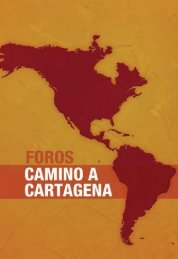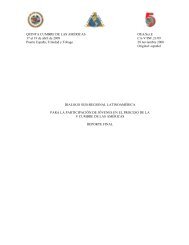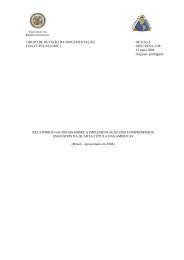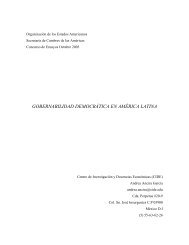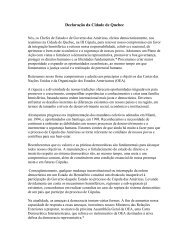The Road to Hemispheric Cooperation: Beyond the Cartagena
The Road to Hemispheric Cooperation: Beyond the Cartagena
The Road to Hemispheric Cooperation: Beyond the Cartagena
Create successful ePaper yourself
Turn your PDF publications into a flip-book with our unique Google optimized e-Paper software.
many Brazilian diplomats, <strong>the</strong> main strategic game is <strong>to</strong> establish<br />
Brazilian hegemony in South America at <strong>the</strong> lasting<br />
expense of U.S. influence. Part of that strategy is <strong>to</strong> undercut<br />
institutions where <strong>the</strong> United States is strong, including<br />
<strong>the</strong> U.S.-initiated Summits of <strong>the</strong> Americas, <strong>to</strong> <strong>the</strong> benefit of<br />
Brazilian-led forums such as <strong>the</strong> newly emerging CELAC,<br />
which purposefully excludes <strong>the</strong> United States.<br />
So what can be done <strong>to</strong> break <strong>the</strong> deadlock over Cuba, as a<br />
number of key Latin American states have said <strong>the</strong>y will not<br />
attend ano<strong>the</strong>r summit unless Cuba is present? Washing<strong>to</strong>n<br />
(with Canadian support) continues <strong>to</strong> argue that Summits<br />
of <strong>the</strong> Americas are exclusive <strong>to</strong> democratically elected<br />
leaders—a position officially adopted by leaders at <strong>the</strong> 2001<br />
Quebec Summit. Yet that was a very soft accord—not written<br />
in<strong>to</strong> any binding treaty—that can readily be amended by<br />
<strong>the</strong> leaders <strong>the</strong>mselves. Emphatically, Cuban participation<br />
in summitry does not imply Cuba taking its seat at <strong>the</strong> OAS,<br />
where <strong>the</strong> bar would be much higher, as <strong>the</strong> central purpose<br />
of <strong>the</strong> OAS <strong>to</strong>day is <strong>the</strong> promotion of democratic norms.<br />
Institutionally, inter-American summitry and <strong>the</strong> OAS are<br />
distinctive, even if <strong>the</strong> OAS has gradually assumed <strong>the</strong> role<br />
of technical secretariat for <strong>the</strong> summits.<br />
Looking ahead, <strong>the</strong> United States must be proactive. One<br />
possible compromise might be <strong>to</strong> invite <strong>the</strong> Cubans <strong>to</strong> attend<br />
some post-<strong>Cartagena</strong> working groups seeking <strong>to</strong> implement<br />
initiatives of possible relevance <strong>to</strong> <strong>the</strong>m. This could<br />
test Cuban interest and intentions. American policymakers<br />
have refused <strong>to</strong> admit, even <strong>to</strong> <strong>the</strong>mselves, that U.S. policy<br />
with regard <strong>to</strong> Cuba entails real diplomatic costs and gives<br />
our competi<strong>to</strong>rs a powerful emotional wedge issue. <strong>The</strong> potential<br />
costs now include endangering <strong>the</strong> valuable regional<br />
institution of inter-American summitry nurtured and built up<br />
over nearly two decades.<br />
<strong>The</strong> <strong>Road</strong> <strong>to</strong> <strong>Hemispheric</strong> <strong>Cooperation</strong>: <strong>Beyond</strong> <strong>the</strong> <strong>Cartagena</strong> Summit of <strong>the</strong> Americas<br />
<strong>The</strong> Brookings Institution ❘ Latin America Initiative<br />
103



